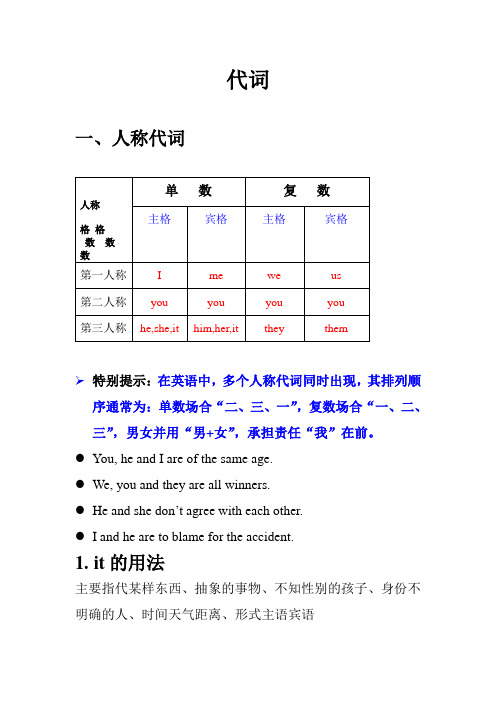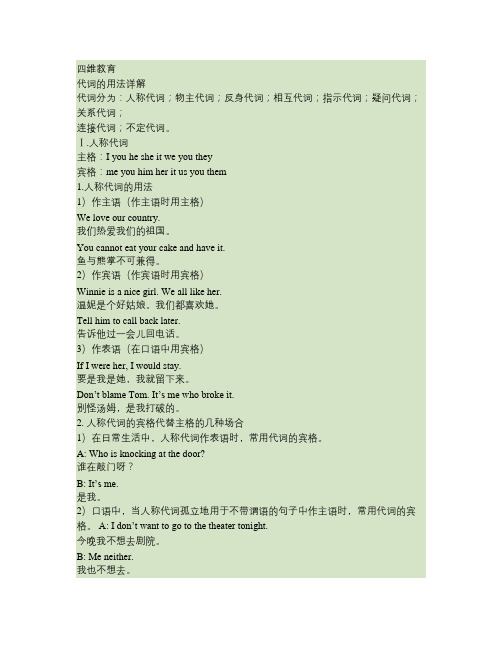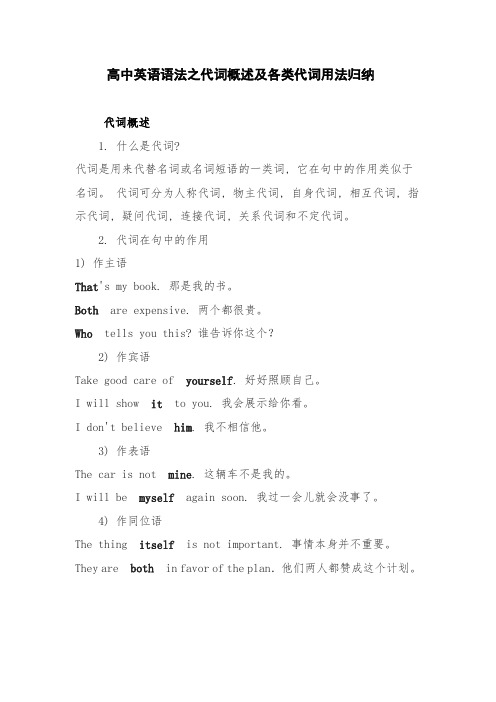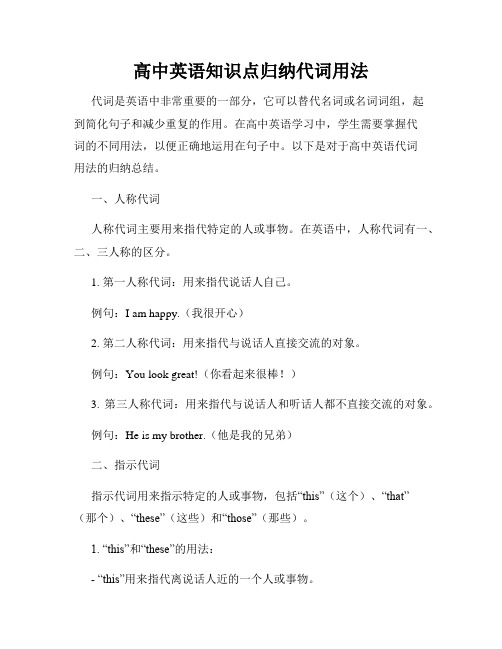高中英语代词的用法详解
(完整版)高中英语代词的用法

代词一、定义与分类代词是代替名词及起名词作用的短语或句子的词。
代词根据其意思和用法可分为人称代词、物主代词、反身代词、指示代词、相互代词、疑问代词、连接代词、关系代词、不定代词九类。
综观历年高考情况,在这九类代词中,不定代词一直是高考英语的重点。
⏹人称代词I , you ,she ,him⏹疑问代词who, whom, whose, which, what (用于引出特殊疑问句的代词)注意:what与which的用法区别:当选择的范围较明确时,用which;不明确时用what。
如:Which color do you like, red, black or white? What color is your car?⏹物主代词my 、your、hers⏹关系代词which 、that、who、whom⏹反身代词myself、yourselves注意:反身代词用于be, feel, seem, look 等后作表语表示身体或精神所处的状态。
如:I'll be myself again in no time. 我一会儿就会好的。
He doesn't feel himself today.I’m not quite myself these days. 我近来身体不大舒服。
⏹连接代词who, whom, what, which, whose, whoever, whatever, whichever主要用于引导主语从句、宾语从句和表语从句等⏹相互代词each other、one another⏹不定代词one、each、another、neither⏹指示代词this、that、those、these注意:a. 为避免重复,可用that 和those 代替前面提到的名词。
如:The playground of this school is bigger than that of that school.(that=the playground)My books are next to those of the monitor.b. 在打电话时,通常用this 指自己,用that指对方:如:Hello. This is Jim. Is that John?c. this 和that 还可用作副词,用以修饰形容词或副词,意为“这么”、“那么”,相当于so。
高中英语语法:代词(共58张PPT)

一、人称代词、物主代词与反身代词
(1)人称代词的基本用法。
归纳
几个人称代词并列时的顺序: 单数并列“二、三、一”, 复数并列“一、二、三” 两性并列“他+她” , 承担责任我在前。 I and he are wrong.我和他都错了。 He and she go to work together.他和她一起去上班。
(1)人称代词的基本用法。 ①做主语 If you want to speak fluent English, you need to listen carefully to native speakers so that you can understand them.如果想讲一口流利的英语,就需要 认真地听母语是英语的人说话,这样你才能理解。 (此句中的三个you分别充当所在句子的主语) Times change, and we change with them.时代总在变,人也在随着变。(we 作change的主语) ②作表语 Who called me just now?谁刚才和我打电话了? It’s him.是他.(him作is的宾语)
一、人称代词、物主代词与反身代词
(2)人称代词的其他用法。 ⑥在谚语和格言中,用he来表示一类人。 He who does not advance loses ground.逆水行舟,不进则退。 (3)it的用法 ①it代指时间、距离、天气、自然现象等。 For example, one evening when it was so warm, I stayed awake on purpose until half past eleven in order to have a good look at the moon by myself.例如,有天晚上天气很 暖和,我故意熬到11点半不睡觉,为的是独自好好欣赏月亮。(it代指天气) ②it代指上文中提到的事物。 We think the Olympic Park is a great place to go because it not only has fantastic stadiums for Olympic Games but also has many beautiful gardens.我们认为奥林匹克公园是 很好的去处,因为那里不仅有奥林匹克运动会使用的大体育场,还有很多美丽的公园。
高中英语语法高频考点精讲系列之代词

代词一、人称代词人称格格数数数单数复数主格宾格主格宾格第一人称I me we us第二人称you you you you第三人称he,she,it him,her,it they them特别提示:在英语中,多个人称代词同时出现,其排列顺序通常为:单数场合“二、三、一”,复数场合“一、二、三”,男女并用“男+女”,承担责任“我”在前。
●You, he and I are of the same age.●We, you and they are all winners.●He and she don’t agree with each other.●I and he are to blame for the accident.1.it的用法主要指代某样东西、抽象的事物、不知性别的孩子、身份不明确的人、时间天气距离、形式主语宾语二、物主代词物主代词分为形容词性物主代词和名词性物主代词两种。
我的你的他的她的它的我们的你们的他们的类型词义形容词性my your his her its our your their 名词性mine yours his hers its ours yours theirs 名词性物主代词=形容词性物主代词+名词●I didn’t borrow his book. I borrowed hers.三、反身代词第一人称第二人称第三人称数人称单数myself yourself himself,herself,itself 复数ourselves yourselves themselves四、指示代词1.this, that, these, those2.such的用法指代上文中提到的人或事物;指代下文中要提到的内容。
●We were second-class citizens and they treated us as such.(指上文,作宾语)●The damage was such that it would cost thousands torepair.(指下文,作表语)特别提示:such修饰的名词前有不定冠词,such放其前;如果有all, no, another, several等表示数量的词时,such放其后。
高中英语知识点归纳代词的分类及用法

高中英语知识点归纳代词的分类及用法代词是英语语法中的一个重要概念,它可以代替名词或名词短语,起到简化表达和避免重复的作用。
在高中英语学习中,了解代词的分类及用法对于学生们掌握语法规则和提高阅读理解能力非常重要。
本文将就代词的分类及用法进行归纳总结,以帮助高中生更好地学习和运用代词。
一、人称代词人称代词主要用来表示说话人、听话人和与说话人、听话人有关的人或事物。
人称代词分为主格和宾格两种形式,分别用于主语和宾语位置。
1.主格形式:I、you、he、she、it、we、they例句:I love cats.(我喜欢猫。
)2.宾格形式:me、you、him、her、it、us、them例句:She gave me a present.(她给了我一个礼物。
)二、物主代词物主代词用来表示所有权或所属关系,分为形容词性物主代词和名词性物主代词两种形式。
1.形容词性物主代词:my、your、his、her、its、our、their例句:This is my book.(这是我的书。
)2.名词性物主代词:mine、yours、his、hers、its、ours、theirs例句:The red book is mine.(这本红色的书是我的。
)三、指示代词指示代词用于指代特定的人或事物,分为近指示代词和远指示代词两种形式。
1.近指示代词:this、these例句:This is my car.(这是我的车。
)2.远指示代词:that、those例句:That is their house.(那是他们的房子。
)四、疑问代词疑问代词用于提问特定的人或事物,主要有who、whom、whose、what、which、where等。
1.who:用于询问人的身份或特征例句:Who is your English teacher?(你的英语老师是谁?)2.whom:用于询问人的宾语例句:Whom did you invite to the party?(你邀请了谁来参加派对?)3.whose:用于询问所有权或所属关系例句:Whose book is this?(这是谁的书?)4.what:用于询问事物或事件例句:What is your favorite color?(你最喜欢的颜色是什么?)5.which:用于询问选择例句:Which book do you want to read?(你想读哪本书?)6.where:用于询问地点或位置例句:Where is the nearest supermarket?(最近的超市在哪里?)五、关系代词关系代词用来引导一个从句,在从句中作主语、宾语或定语。
高中英语代词的用法详解

四维教育代词的用法详解代词分为:人称代词;物主代词;反身代词;相互代词;指示代词;疑问代词;关系代词;连接代词;不定代词。
Ⅰ.人称代词主格:I you he she it we you they宾格:me you him her it us you them1.人称代词的用法1)作主语(作主语时用主格)We love our country.我们热爱我们的祖国。
You cannot eat your cake and have it.鱼与熊掌不可兼得。
2)作宾语(作宾语时用宾格)Winnie is a nice girl. We all like her.温妮是个好姑娘。
我们都喜欢她。
Tell him to call back later.告诉他过一会儿回电话。
3)作表语(在口语中用宾格)If I were her, I would stay.要是我是她,我就留下来。
Don’t blame Tom. It’s me who broke it.别怪汤姆,是我打破的。
2. 人称代词的宾格代替主格的几种场合1)在日常生活中,人称代词作表语时,常用代词的宾格。
A: Who is knocking at the door?谁在敲门呀?B: It’s me.是我。
2)口语中,当人称代词孤立地用于不带谓语的句子中作主语时,常用代词的宾格。
A: I don’t want to go to the theater tonight.今晚我不想去剧院。
B: Me neither.我也不想去。
A: I’d like to stay here for another week.我想在这里再呆一周。
B: Me too.我也是。
3)在带as 和than 的比较级后面,许多场合下用代词的宾格。
She knows me as well as him.她像了解他一样了解我。
He is taller than me.他比我高。
4)口语中,当人称代词用于带有强烈感情色彩的句子中作主语且其后不带宾语时,多用代词的宾格。
代词的用法归纳总结

代词的用法归纳总结1.主格代词作为主语或主语补语出现。
如:I am a student. He is tall.2.宾格代词作为直接宾语,间接宾语或介词宾语出现。
如:Mary gave me a book. She talked to him. The cat is playing with them.3.形容词性物主代词用来修饰名词,表示名词的所有者。
如:My book is on the table. His hat is black.4.名词性物主代词直接代替名词,表示名词所代表的意义。
如:My is here. Yours is over there.5.反身代词表示做主语的人或物同时也是动词的宾语,为自己而行动或受到影响。
如:I hurt myself. She taught herself to drive.6.强调代词用来强调在句子中重要的部分。
如:It was John who won the game. I myself will finish the work.7.关系代词引导定语从句并在从句中担任主语、宾语或表语。
如:The girl who stands next to you is my sister.8.疑问代词用于疑问句中,用来代替并询问事物的种类、数量、性质等。
如:What is your name? How much does it cost?拓展:在口语中,有时会使用“they”代替“he/she”来避免性别歧视和麻烦。
例如:If someone wants to lend money, they have to show proof of income.此外,在一些方言或英语口音中,也会出现一些不规范的代词用法。
高中英语语法之代词概述及各类代词用法讲义

高中英语语法之代词概述及各类代词用法归纳代词概述1. 什么是代词?代词是用来代替名词或名词短语的一类词, 它在句中的作用类似于名词。
代词可分为人称代词, 物主代词, 自身代词, 相互代词, 指示代词, 疑问代词, 连接代词, 关系代词和不定代词。
2. 代词在句中的作用1) 作主语That's my book. 那是我的书。
Both are expensive. 两个都很贵。
Who tells you this? 谁告诉你这个?2) 作宾语Take good care of yourself. 好好照顾自己。
I will show it to you. 我会展示给你看。
I don't believe him. 我不相信他。
3) 作表语The car is not mine. 这辆车不是我的。
I will be myself again soon. 我过一会儿就会没事了。
4) 作同位语The thing itself is not important. 事情本身并不重要。
They are both in favor of the plan.他们两人都赞成这个计划。
5) 作呼语You stand here and wait for the bus. 你站在这儿等公车吧。
Be patient, everyone. 大家都耐心点吧。
6) 作定语That's my glasses. 那是我的眼镜。
I'll buy that umbrella.人称代词1. 人称代词的词汇a) 人称代词主格 (在句中作主语)单数第一人称: I (我)单数第二人称: you (你)单数第三人称: he, she, it (他,她,它)复数第一人称: we(我们)复数第二人称: you(你们)复数第三人称: they (他们/她们/它们)b) 人称代词宾格 (在句中作宾语)单数第一人称: me (我)单数第二人称: you (你)单数第三人称: him, her, it(他,她,它)复数第一人称: us(我们)复数第二人称: you(你们)复数第三人称: them (他们/她们/它们)2. 人称代词在句中的作用1) 作主语I am a student. 我是一名学生。
高中英语知识点归纳代词用法

高中英语知识点归纳代词用法代词是英语中非常重要的一部分,它可以替代名词或名词词组,起到简化句子和减少重复的作用。
在高中英语学习中,学生需要掌握代词的不同用法,以便正确地运用在句子中。
以下是对于高中英语代词用法的归纳总结。
一、人称代词人称代词主要用来指代特定的人或事物。
在英语中,人称代词有一、二、三人称的区分。
1. 第一人称代词:用来指代说话人自己。
例句:I am happy.(我很开心)2. 第二人称代词:用来指代与说话人直接交流的对象。
例句:You look great!(你看起来很棒!)3. 第三人称代词:用来指代与说话人和听话人都不直接交流的对象。
例句:He is my brother.(他是我的兄弟)二、指示代词指示代词用来指示特定的人或事物,包括“this”(这个)、“that”(那个)、“these”(这些)和“those”(那些)。
1. “this”和“these”的用法:- “this”用来指代离说话人近的一个人或事物。
例句:This book is interesting.(这本书很有趣)- “these”用来指代离说话人近的多个人或事物。
例句:These flowers are beautiful.(这些花很漂亮)2. “that”和“those”的用法:- “that”用来指代离说话人远的一个人或事物。
例句:That car is expensive.(那辆车很贵)- “those”用来指代离说话人远的多个人或事物。
例句:Those houses are big.(那些房子很大)三、反身代词反身代词用于表示某个动作反射到自己身上,常见的反身代词有“myself”(我自己)、“yourself”(你自己)、“himself”(他自己)等。
1. 反身代词的使用:- 句中的反身代词与句子主语在人称和数上保持一致。
例句:I can do it myself.(我能自己做到)- 反身代词也可用作强调,强调句中的人或事物。
- 1、下载文档前请自行甄别文档内容的完整性,平台不提供额外的编辑、内容补充、找答案等附加服务。
- 2、"仅部分预览"的文档,不可在线预览部分如存在完整性等问题,可反馈申请退款(可完整预览的文档不适用该条件!)。
- 3、如文档侵犯您的权益,请联系客服反馈,我们会尽快为您处理(人工客服工作时间:9:00-18:30)。
代词的用法详解代词分为:人称代词;物主代词;反身代词;相互代词;指示代词;疑问代词;关系代词;连接代词;不定代词。
Ⅰ.人称代词主格:I you he she it we you they宾格:me you him her it us you them1.人称代词的用法1)作主语(作主语时用主格)We love our country.我们热爱我们的祖国。
You cannot eat your cake and have it.鱼与熊掌不可兼得。
2)作宾语(作宾语时用宾格)Winnie is a nice girl. We all like her.温妮是个好姑娘。
我们都喜欢她。
Tell him to call back later.告诉他过一会儿回电话。
3)作表语(在口语中用宾格)If I were her, I would stay.要是我是她,我就留下来。
Don’t blame Tom. It’s me who broke it.别怪汤姆,是我打破的。
2. 人称代词的宾格代替主格的几种场合1)在日常生活中,人称代词作表语时,常用代词的宾格。
A: Who is knocking at the door?谁在敲门呀?B: It’s me.是我。
2)口语中,当人称代词孤立地用于不带谓语的句子中作主语时,常用代词的宾格。
A: I don’t want to go to the theater tonight.今晚我不想去剧院。
B: Me neither.我也不想去。
A: I’d like to stay here for another week.我想在这里再呆一周。
B: Me too.我也是。
3)在带as 和than 的比较级后面,许多场合下用代词的宾格。
She knows me as well as him.她像了解他一样了解我。
He is taller than me.他比我高。
4)口语中,当人称代词用于带有强烈感情色彩的句子中作主语且其后不带宾语时,多用代词的宾格。
A: You ought to do it at once.你应该马上做。
B: What? Me!什么?我!3.多个人称代词并列时的顺序在英语中如果出现多个人称代词,其排列的顺序主要有如下几种情况:1)单数的场合you +he/she +IYou, he and I will go shopping tomorrow.你,他和我明天将去购物。
2)复数的场合we +you +theyWe, you and they are all Chinese.我们,你们和他们都是中国人。
3)男女两性并列场合he+sheHe and she don’t agree with me.他和她不同意我的看法。
4)承认错误或承担责任时I +he/she +youI and he are to blame for the accident.我和他应为这次事故承担责任。
注意:You and I 是固定结构,即使是在承认过失时,词序也不变。
You and I are to blame.我和你应为此负责。
4.he和she 的特殊用法he 可指代雄性动物或庞大而又威猛之物。
she 可指代雌性动物或柔弱,优美之物,也可代表拟人化说法中的国家,月亮,汽车,轮船等无生命的东西,以表达其喜爱或亲切之情。
1)The fierce tiger came at the monkey, but he missed her. (he指tiger,her指monkey)凶猛的老虎向猴子扑来,可没扑到。
2)China will always do what she has promised to do.中国将始终履行自己的诺言。
3)The moon loses her brilliance when the sun makes his appearance.太阳一出来,月亮就失去了她的光辉。
4)She was Titanic, a ship which was said never to sink.她就是泰坦尼克号,据说是一艘永不沉没的船。
5.报刊的编辑和文章的作者,在发表观点时,常用we 代替I(同样地,用our 代替my)1)We believe that China will still make greater progress.我们相信中国将会有更大的发展。
2)In our opinion this is the best film of the year.我们认为这是今年最好的一部电影。
6.we, you, they 有时超出人称的区别,都可以泛指一般人,指“人们”,单数用he.1) We never know the worth of the well till it is dry.失去了才知道可贵。
2)You can’t live without air and water离开空气和水,人就无法生存。
3)They say there’s going to be another good harvest this year.人们说今年又将是个丰收年。
4)He laughs best who laughs last.谁笑到最后谁笑的最好。
6.注意比较:1) I love you better than he.(I love you better than he loves you.)我比他爱你。
2)I love you better than him. (I love you better than I love him.) 我爱你胜过爱他。
7. it 的用法1) 指刚提到过的事物,以避免重复。
A: When did the letter come?这封信什么时候送来的?B: It came this morning.今天早上送来的。
2)指未知性别的婴儿或孩子。
What a beautiful baby, is it a boy?多漂亮的宝宝呀,是男孩吗?3)指不明身份的人。
A: Who is it knocking at the door?谁在敲门?B: It might be the postman.可能是邮递员。
4)指时间或季节。
It is ten o’clock.现在是十点钟。
It was nearly midnight when she came back.她回来时已快到午夜了。
It is late autumn.现在已是深秋了。
5)指天气,环境。
It’s raining hard outside.外面雨下得正大。
It is noisy in here.这里很嘈杂。
6)指距离。
It is half an hour’s walk to the city centre.走到市中心只需半小时。
7)用于形式主语或形式宾语。
简单句:It is hard to learn English well.形式主语真正主语I find it hard to learn English well. (hard为语补足语,语义上的补充)形式宾语真正宾语注:宾语,宾语补足语合称为复合宾语。
复合句:I find (that) it is hard to learn English well. (宾语从句)主句系表8)用于强调结构中It is/was …that/who…(不作任何成分)The students are learning grammar in the classroom now.→It is the students who are learning grammar in the classroom now.→It is grammar that the students are learning in the classroom now.→It is in the classroom that the students are learning grammar now.→It is now that the students are learning grammar in the classroom.注意:在强调结构中,不能强调谓语部分。
9)用来代替上文提到过的句子。
You saved my life; I’ll never forget it.注意:this 上文发生过的,下文要说的事。
(通常)that 只能指代上文说过的一个名词。
it 通常指代上文的一句话。
He bought me a shirt. I like it.He bought me a shirt. I like that.It常用的固定句型:1)It takes sb…to do…某人用多长时间做某事It took the man a week to mend our roof.这些人花了一周时间修好我们的屋顶。
2)It’s (about/high) time that…should…是该做某事的时候了It’s (about/high) time that we should take action.该是采取行动的时候了。
3)It’s the+序数词+time (that)…have +v-ed第几次做某事了It is the third time that he has failed the driving test.这是他第三次没能通过驾驶考试。
4)It’s…s ince…从…已(多长时间了)It is five years since he stopped smoking.他戒烟五年了。
It is five years since we last met.从我们上次见面到现在已有五年了。
5)It was not…before…;It won’t be long before…用不了多长时间某动作发生了; 过不了多久某动作将要发生It was not long before they arrived. It won’t be long before he returns from abroad.没过多久他们就到了。
不久以后他们就要回国。
Ⅱ物主代词形容词性物主代词:my, your, his, her, its, our, your, their名词性物主代词:mine, yours, his, hers, its, ours,yours,theirs1.形容词性物主代词相当于形容词,放在名词前作定语。
It’s not my computer. 那不是我的电脑。
She turned away her eyes. 她把目光移开。
Is this your coat? 这是你的大衣吗?注:1)形容词性物主代词后可加own表示强调,意为“自己的,完全属于自己的”。
